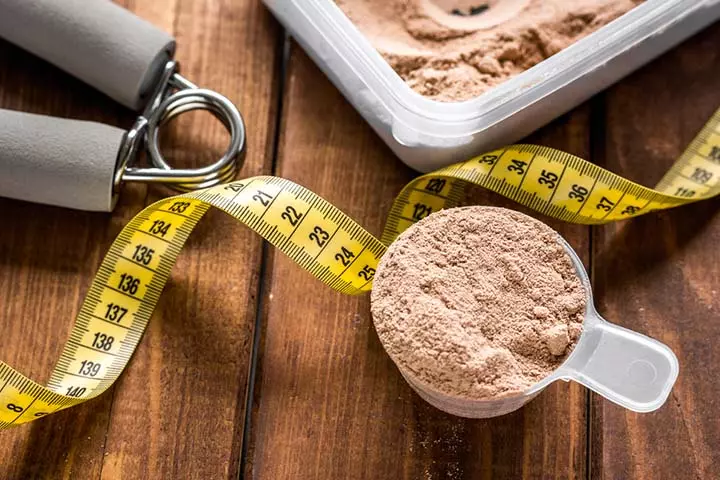
Image: Shutterstock
Many teenagers are drawn to pre-workout supplements such as whey protein under the belief that they can aid in improving their physical performance and appearance. However, parents are often worried about the safety of whey protein for teenagers. Although good quality whey protein may have certain benefits, such as increasing muscle mass, strengthening bones, and improving memory, taking them in excess may lead to issues such as increased acne. Hence, it is better to consult a doctor before consuming whey protein. Read the post to know in detail about the safety of whey protein for teens, its benefits, and side effects.

Key Pointers
- Teens often consume whey protein to build muscle, but overdoing it can make acne breakouts worse.
- Whey protein has many benefits, including improved bone health, memory, weight loss, and muscle growth.
- In addition to these benefits, whey protein can also help treat psoriasis and dental plaque, reduce stress and depression, and regulate blood sugar.
- Whey protein has been shown to lower blood pressure, cholesterol, and triglyceride levels, which can reduce the risk of heart disease.
What Is Whey Protein?
Whey protein, derived from milk, is a protein powerhouse containing all essential amino acids crucial for muscle growth and repair. Derived from dairy products, especially milk, it is extracted during cheese-making and then concentrated into a versatile powder. Whether as a conventional food or supplement, it’s incorporated into various products such as gels, bars, and shakes (1).
Whey protein is believed to enhance athletic performance and strength, and people also explore its potential benefits for conditions such as asthma, diabetes, and weight loss. However, scientific evidence supporting these applications remains inconclusive (2). Nonetheless, whey protein is a convenient and effective dietary supplement, providing a comprehensive amino acid profile essential for optimal muscle function and recovery. It also enhances the nutritional content of the diet and may have a positive impact on a teen’s metabolism.
Is Whey Protein Safe For Teenagers?
Whey is a milk-derived protein. Many foods contain it, and it is pretty popular among people looking to build their muscles or under strength training. If your teenager is taking whey protein while lifting weights, whey is not what you should worry about. It is weightlifting that can pose serious dangers to your teen. Here are some other points you should know about whey protein:
- Many believe consuming whey protein post-workout sessions can cause stunted growth. However, there is no evidence to support this claim.
- The one problem that may bother your teen about whey protein, is that it can lead to acne flare-ups (3)! For teens already struggling with acne, this can be bad news!

- The problem with whey protein arises if it becomes more than just a supplement. If your teen sips on it all through the day, it can lead to adverse effects. Sharing her insights with the Children’s Hospital of Orange County (CHOC), pediatrician and sports expert Dr. Jacqueline Winkelmann states that teens often consume more protein than recommended, which can lead to side effects such as diarrhea, nausea, and liver and kidney issues (13).
- To make sure that your teen is getting the best of whey protein, avoid most commercially packed fitness supplements containing this healthy protein. Most of these supplements are below par and can cause more harm than good. That is why it is important to buy whey protein derived from raw, pasture-fed milk.
 Quick fact
Quick factTypes Of Whey Protein
Here are three primary types of whey proteins used in commercial powders, categorized based on their distinct characteristics and components (17) (18) (19):
- Whey protein concentrate (WPC): It is a high-quality, nutrient-dense protein source that contains 70–80% protein and some fat and lactose while preserving most of its nutrients. It is an affordable option and often recommended for post-workout recovery in teens who require protein supplementation for sports or physical activity.
- Whey protein isolate (WPI): It has around 90% or more protein, making it the purest form of whey protein. It is low in fat and calories, with negligible lactose, making it suitable for teens who are lactose intolerant or those aiming to maintain muscle mass while limiting calorie intake. However, it is costlier than WPC.
- Whey protein hydrolysate (WPH): The hydrolysate is a pre-digested protein that is easy to digest and absorb. It is suitable for teens looking for easily digestible protein after an intense physical activity. It is also used in baby formula and supplements to address nutritional deficiencies. WPH is generally costlier than both WPI and WPH.
Note: Excessive whey protein intake can lead to health issues and disrupt nutritional balance. Regardless of the type, whey protein should always be consumed in recommended quantities, as a nutritionist or healthcare provider suggests.
Recounting her experience of deciding whether to use whey protein for her teen, blogger and mother of four Laura Doyle shares, “My latest trial while parenting a child new to the teenage world is protein powder. My son assures me, ‘Everyone is taking it,’ and although it is most likely harmless, I don’t want to take that risk.
“I decided to speak to a professional, a nutritionist, to get some clarity. He said that while whey is safe and a great way to get a convenient source of protein, it shouldn’t take priority over main food sources (i).”
Benefits Of Whey Protein For Teenagers
Should your teen consume whey protein? There is no reason they shouldn’t. If you are still skeptical, check out the amazing benefits it has to offer:
1. Builds muscle mass
Whey protein can help your teen build lean muscle mass (4). Yes, all those bodybuilding websites were telling the truth! However, experts suggest that teens spread out their protein intake throughout the day and have whey protein before exercise for the best results (19). Combining whey protein consumption with healthy eating habits, well-balanced meals, and a consistent exercise routine is also important. Furthermore, incorporating nutritional supplements, such as protein, into an endurance training regimen might increase muscle protein synthesisiA process in which the body makes proteins from amino acids to support growth and repair .
 Quick tip
Quick tip2. Helps lose weight

Obesity today is a big problem among teens. If your young lady is trying to lose weight, whey protein can help her. It is known to suppress appetite while providing the body with high-quality protein (5). This can help to lose weight, in a healthy manner.
3. Keeps bones healthy
Teenagers may feel like they have grown old enough, but the fact is different. The teen body is still growing. And with whey protein, they can help their bones stay healthy and strong (6).
4. Improves memory
Is your teen struggling at school? Try including whey protein to her diet. Whey protein is known to improve mental capacity and memory (7).
5. Reduces stress and depression
Teenage is a difficult time. Many teens suffer from stress and depression due to their changing hormones as well as pressure at home and school. If your teen too is struggling with a case of the ‘blues’, include some whey protein in her diet. Whey protein is known to help calm the mind and provide relief from stress and anxiety. (8)
6. Balances blood sugar levels
Diabetes is on the rise, even among the young. To keep your teen protected try whey protein! This amazing protein is known to control blood sugar levels in the body (9). It can even help people with type 2 diabetesiA long-term condition characterized by insulin resistance in the body, leading to high blood sugar levels .
7. May help treat dental plaque

Is your teen suffering from dental plaquei A thin, sticky bacterial coating developing on the teeth that may cause tooth decay and gum problems ? Try toothpaste enriched with whey protein!
8. Reduces risk of heart diseases
Whey protein is known to lower cholesterol and triglycerideiGroup of fats derived from various foods that help store and provide energy levels in the body
(10). This can help keep your teen safe from cardiovascular diseases.
9. Treats psoriasis
Teenagers suffering from psoriasisiA skin condition characterized by dry, itchy, and scaly patches on the scalp and the body can benefit from whey protein (11). Symptoms like itchy, flaky skin can be taken care of with this amazing ingredient.
10. Controls blood pressure
High blood pressure is still thought to be an ‘adult’ problem. But teens too can fall prey to this deadly disease. With whey protein in her diet, you can ensure that your teen stays safe from high BP (12).
11. Supports immune function
Whey, the precursor in whey protein, contains immunoglobulins and lactoferrin that can boost immune function. It is also believed to have antibacterial and antiviral properties, which can help protect teenagers from infections (16).
Frequently Asked Questions
1. Is it necessary for teenagers to take whey protein as part of their diet?
No, teenagers don’t need to take whey protein or other protein supplements, even if they are athletes. Protein needs can be met through diet alone by including protein-rich foods for teens, such as lean meats, eggs, dairy, etc. Moreover, protein supplements are not regulated by the FDA and may contain sweeteners and additives that may not be suitable for teenagers (13).
2. Is whey protein suitable for vegetarian and vegan teenagers?
Whey protein may be considered a dairy product, which means it is suitable for vegetarians (those who avoid meat but not milk products). However, as vegans avoid all types of animal products, whey protein is not suitable for them.
4. What happens if I drink whey protein without working out?
General consultant and gastroenterologist Dr. M Madhan Kumar says, “Drinking whey protein without working out can still provide benefits, such as supporting overall protein intake and potentially aiding muscle recovery. However, the full benefits of whey protein, like muscle building and strength improvement, are more noticeable when combined with regular resistance training or exercise.” Hence it is recommended to consult with a healthcare professional to develop an apt workout plan for teenagers that can maximize the benefits of whey protein.
5. What are some vegan protein options for teenagers?
For teenagers on a vegan diet, options like pea protein, hemp protein, and soy protein can provide the essential amino acids without using animal products. It is important to pick good-quality plant-based protein powders and combine them with whole food sources to meet their protein needs.
6. What is the difference between supplements and whole foods?
Supplements are concentrated sources of specific nutrients, while whole foods are natural sources of nutrients and beneficial compounds. Although whey protein can be helpful, teenagers should focus on whole-food protein sources like lean meats, fish, eggs, nuts, seeds, legumes, peas, beans, tofu, and dairy. This way, they can ensure a balanced intake of nutrients that supplements might not offer.
7. What are the common misconceptions about whey protein?
There are several myths about whey protein, such as being unsafe or causing unnecessary weight gain in teens. However, when appropriately used, whey protein can be safe and beneficial. Some parents also believe every child needs whey protein as part of their daily diet. It isn’t true, as most teens can meet their protein needs through food alone. Supplements like whey protein are usually advised when it’s difficult to get enough protein from food or for teens with higher protein needs, such as athletes (21).
8. How to choose the right whey protein for my teen?
Before using whey protein for teenagers, a few factors to consider are their dietary needs, activity level, and any allergies. Whey protein concentrate is a key ingredient in commercial protein drinks, while isolate is suitable for lactose-intolerant individuals. However, since each teen’s health status and needs may differ, it is essential to review the ingredients and labels before buying any supplements and consult a healthcare professional before introducing them (19).
Whey is a milk derivative many teenagers love to consume because it aids in muscle building. However, whey protein for teenagers has several other benefits, including keeping bones healthy, improving memory, muscle repair or recovery, and balancing sugar levels. It is a safe addition to your children’s diet. However, making whey protein a major part of their regular diet or drinking it in excess may cause adverse effects. Hence, encourage children to maintain a balanced diet when consuming this nutrient-dense, high-quality protein. Always buy whey protein made from the milk of pasture-fed cows from a reliable brand. If you have any questions regarding the safety of whey protein for your child, consult a healthcare professional.
Infographic: Benefits Of Whey Protein For Teenagers
Whey protein is a protein supplement that contains essential amino acids and supports muscle and overall growth in teenagers. The infographic below details the advantages of whey protein; however, we suggest you speak to a doctor to comprehend the correct quantity, timing, and whey protein regimen for your teen.
Some thing wrong with infographic shortcode. please verify shortcode syntax
Illustration: Health Benefits Of Whey Protein For Teenagers

Image: Dall·E/MomJunction Design Team
Are you concerned about the potential harmful consequences of protein powder on your health? Explore this video to learn whether it can cause acne, hair loss, and kidney problems.
Personal Experience: Source
MomJunction articles include first-hand experiences to provide you with better insights through real-life narratives. Here are the sources of personal accounts referenced in this article.
i. My 13-year-old wants me to buy him protein powder- What should I do?;https://evoke.ie/2025/10/04/life-style/protein-powder-teenager
References
- Whey protein: The basics.
https://www.opss.org/article/whey-protein-basics - Whey Protein: MedlinePlus Supplements.
https://medlineplus.gov/druginfo/natural/833.html - Nanette B Silverberg; (2012); Whey protein precipitating moderate to severe acne flares in 5 teenaged athletes
https://pubmed.ncbi.nlm.nih.gov/22988649/ - Daniel W. D. West, et al.; (2017); Whey Protein Supplementation Enhances Whole Body Protein Metabolism and Performance Recovery after Resistance Exercise: A Double-Blind Crossover Study
https://www.ncbi.nlm.nih.gov/pmc/articles/PMC5537849/ - Paige E Miller, et al.; ((2014); Effects of whey protein and resistance exercise on body composition: a meta-analysis of randomized controlled trials
https://pubmed.ncbi.nlm.nih.gov/24724774/ - Marlena C Kruger, et al. (2005); The effect of whey acidic protein fractions on bone loss in the ovariectomised rat
https://pubmed.ncbi.nlm.nih.gov/16115359/ - C Rob Markus, et al.; (2002); Whey protein rich in alpha-lactalbumin increases the ratio of plasma tryptophan to the sum of the other large neutral amino acids and improves cognitive performance in stress-vulnerable subjects
https://pubmed.ncbi.nlm.nih.gov/12036812/ - O Yu Vekovischeva, et al.; The effects of native whey and α-lactalbumin on the social and individual behaviour of C57BL/6J mice
https://pubmed.ncbi.nlm.nih.gov/23507076/ - Daniela Jakubowicz, et al.; Incretin, insulinotropic and glucose-lowering effects of whey protein pre-load in type 2 diabetes: a randomised clinical trial
https://pubmed.ncbi.nlm.nih.gov/25005331/ - Sonja Graf, et al.; Effects of whey protein supplements on metabolism: evidence from human intervention studies
https://pubmed.ncbi.nlm.nih.gov/21912246/ - Ronald Prussick, et al.; Psoriasis Improvement in Patients Using Glutathione-enhancing, Nondenatured Whey Protein Isolate: A Pilot Study
https://www.ncbi.nlm.nih.gov/pmc/articles/PMC3805302/ - Sebely Pal and Vanessa Ellis, (2010); The chronic effects of whey proteins on blood pressure, vascular function, and inflammatory markers in overweight individuals
https://pubmed.ncbi.nlm.nih.gov/19893505/ - Protein Powders and Teens: Are They Safe? Are They Necessary?
https://health.choc.org/protein-powders-and-teens-are-they-safe/ - Suggested Protein Supplements.
https://www.hopkinsmedicine.org/-/media/bariatrics/nutrition-suggested-protein-supplements.pdf - Protein.
https://nutritionsource.hsph.harvard.edu/what-should-you-eat/protein/ - Fabian Ostertag and Jörg Hinrichs; (2025); Enrichment of Lactoferrin and Immunoglobulin G from Acid Whey by Cross-Flow Filtration.
https://pubmed.ncbi.nlm.nih.gov/37297408/ - Protein Powder: The What, Why, & How To Choose.
https://healthcenter.uga.edu/protein-powder-the-what-why-how-to-choose/ - Kriti Sharma and E.S. Chauhan; (2018); Multifaceted Whey Protein: Its Applications in Food Industry.
https://www.ijhsr.org/IJHSR_Vol.8_Issue.10_Oct2018/38.pdf - Is Whey Protein Good for You?
https://health.clevelandclinic.org/is-whey-protein-good-for-you - Sporting performance and food.
https://www.betterhealth.vic.gov.au/health/healthyliving/sporting-performance-and-food - The scoop on protein powder.
https://www.health.harvard.edu/blog/the-scoop-on-protein-powder-2020030918986
Community Experiences
Join the conversation and become a part of our nurturing community! Share your stories, experiences, and insights to connect with fellow parents.
Read full bio of Dr. Dur Afshar Agha
- Dr. Madhan Kumar Madathupalayam Velusamy is a surgical gastroenterologist with over 23 years of experience. He graduated from Coimbatore Medical College and completed his post-graduate studies at Sri Ramachandra Medical College and Research Institute, Chennai. Dr. Velusamy received his DNB in surgical gastroenterology from Gem Hospital, Coimbatore, and is a visiting surgeon and faculty member at various hospitals in Western Tamil Nadu.
 Dr. Madhan Kumar Madathupalayam Velusamy is a surgical gastroenterologist with over 23 years of experience. He graduated from Coimbatore Medical College and completed his post-graduate studies at Sri Ramachandra Medical College and Research Institute, Chennai. Dr. Velusamy received his DNB in surgical gastroenterology from Gem Hospital, Coimbatore, and is a visiting surgeon and faculty member at various hospitals in Western Tamil Nadu.
Dr. Madhan Kumar Madathupalayam Velusamy is a surgical gastroenterologist with over 23 years of experience. He graduated from Coimbatore Medical College and completed his post-graduate studies at Sri Ramachandra Medical College and Research Institute, Chennai. Dr. Velusamy received his DNB in surgical gastroenterology from Gem Hospital, Coimbatore, and is a visiting surgeon and faculty member at various hospitals in Western Tamil Nadu.
Read full bio of Ria Saha
Read full bio of Swati Patwal
Read full bio of Dr. Joyani Das


















